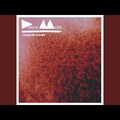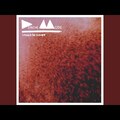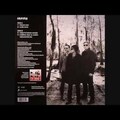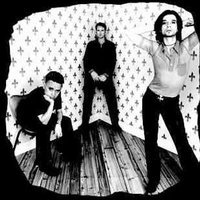
Depeche Mode just released their 13th album Delta Machine, their strongest outing of the 21st century. Though they’ve been at it for over three decades, they show few signs of slowing and remain as relevant as ever: They’re constantly being covered (“Just Can’t Get Enough,” the band’s first single, showed up this season on Glee), and as frontman Dave Gahan points out, also regularly providing inspiration for a new generation of boundary-pushing artists.
EW: Your new album Delta Machine was made both in New York, where you live, and in California where Martin Gore has his studio. How does Depeche Mode work being a bi-coastal operation?
Dave Gahan: Depeche Mode is a bit of a revolving door when it comes to other people that work on our record since Alan Wilder left the band 20 years ago. We’ve had to adapt to different ways of working on things. This time we worked with Chris Berg who is a Swedish musician, and he’s worked with bands like Fever Ray and the Knife. He does sort of hardcore electronic stuff. He fit right in, he knew exactly what he was doing, he was very bold, he had great ideas. Martin and I both need a different angle, and that’s what makes it interesting. But to answer your question, yes, Martin’s out there in California, I’m here in New York, so basically we just the recording in half. He has a nice studio in his house, too. This record was really kind of a pleasure to make with Martin. He’s in great shape, he’s writing great songs. He’s as positive as we get as musicians. We’ve come a long way together, we see our strengths and we’ve come to this place where we have a very strong musical bond. I think that just happens with time. Being in a band, you spend the first 10 years chasing something. You spend the next 10 years trying to hold onto it. We’ve spent the last 10 years just kind of doing our own thing. I think there’s a great strength in having the courage and also having the support to do what you want to do when you’re an artist in any way shape or form. And we’ve been lucky to have some great people working with us.
You say you and Martin are positive, but Delta Machine is still pretty dark. Where does that come from?
That’s just in us. We look at he other side of things and I think out of that—it sounds corny, but those spaces that you get yourself into that can be kind of destructive and dark. We say better out than in, and if you can somehow write out of that and then put that into a place that has a feeling of hope about it as well as the despair, I find that that’s the place where it’s really human. A lot of people would say that we don’t make very human-sounding music, but it seems to move a lot of people and a lot of people identify with it on very deep levels. Once a day when I’m walking around New York, somebody will just come up to me and say, “Thank you so much for your music,” or, “Oh you helped me through college,” or “I don’t know what I would have done without that song.” So there’s something about what we do that people respond to, and I think you can look at it in two different ways. Yes, it’s got a feel about it that can be dark at times. The tone in my voice evokes that kind of imagery, and I’ve chosen to embrace that rather than change it. It’s kind of who I am. I understand when people say, “Oh it’s so dark, so heavy.” But I think it has both dark and lightness. I think that’s life.
Why are you so obsessed with sacred imagery—crosses, angels, saviors and the like? Is that part of it?
Martin and I are both interested in that yearning to feel whole with yourself and the world. It’s something that we all want to feel. I have young-ish kids, they’re 25, 20, and 13. They talk to me about that: “I don’t fit in, I don’t this or that.” Music is an art form that actually transcends all that not feeling a part of. It does for me. I don’t know what that is, I don’t claim to have this image of a man in the sky with the big beard, but I do believe the universe has a real power and I think music is definitely a part of that. It brings people together in harmony. I know that Martin yearns for that as well, and I think that both of us have tried different angles with that, and we’ve both had our fair share of drinking, alcohol, and going down those roads of different girls in different places. The bottom line is your kind of left with yourself. You have to choose at some point. It’s like, “I can’t do this anymore.” And in way, it’s a blessing when that happens and if you manage to get to the other side of that and you can put down the booze and different things open up. It doesn’t work for everybody but certainly worked for me.
Your songs are still covered quite often. Is that flattering or frustrating?
I think it has to be flattering. From Johnny Cash to Marilyn Manson, there’s so many different versions of things out there. You can always tell a good song if you hear it in different ways and it still stands up. The Johnny Cash version of “Personal Jesus” is the ultimate version of that song to me. It’s probably even truer than our own in that it stands as a song and the vocal that’s behind it evokes so much feeling within those words and melodies. That’s like Elvis covering one of your songs! It doesn’t get better than that. You know, it’s very flattering and it’s a real testament to our influence on a lot of other musicians, which is for me the highest honor. Someone said to me the other day, “I was watching Glee the other day and they were singing ‘Just Can’t Get Enough.’” And I said, “Yeah, it’s one of the first things we did, really.” And I realized that was recorded in 1980. He said, “Wow, that’s a long time ago.” And it is, isn’t it? It’s more than half my life, and it’s kind of wild that we’re still doing this and there still seems to be a great deal of interest in what we do. I feel very grateful for that.
But that also must be vindicating, considering how many times you’ve been written off, even when you were at your peak.
I read the other day somewhere about all these bands that had never received Grammys. For instance, Led Zeppelin. That surprised me on one level. On another level, it didn’t, because they weren’t that well-received critically. It’s that kind of band. They’re doing their own thing and they were kind of criticized for basically playing the blues and turning it up, so they gave it a different spin. And of course years and years later, you listen to their music and you can just hear how amazing it is. The way the four musicians could get into a room together and make that kind of noise to me is just incredible. But it depends how you judge what is good and what isn’t good. I sat and watched some of the Grammys, and it is what it is. Of course it’s very nice to be given an award for something. We have not had one. You can put us in that category. We’ve never even been given a Brit Award, which is even more insane. Not that we care. It doesn’t make any difference to what we do. For years I wasn’t OK with it. I thought about it too much. We really do get a fair amount of praise.
Have you run into any current musicians who cite Depeche Mode as an influence that surprised you?
We were in the studio in New York filming and recording some live tracks toward the end of the sessions. Suddenly in the doorway, I sense this presence, and there’s this guy standing there and he’s just watching. Who’s that? An assistant said to me, “Do you mind? Frank Ocean is hanging out and he’s in another studio and he really wants to meet you guys.” I wouldn’t have assumed he knew us, but it turned out he was a big fan of the band and he was watching us perform and he was like, “Wow. This is the real deal, this is the real thing.” Martin and Chris actually ended up doing a track with him, which I think is going to be a part of his new record. They’re doing some electronic, modular synthesizer stuff that he really wanted. That’s how diverse it gets for us. I read that Jay-Z has mentioned he’s kind of influenced in some way by Depeche Mode. Now that’s not necessarily the songs or my voice. I think it’s about our approach, the way that we’ve done it out ourselves, that we’ve built something. And I think there’s a lot of different aspects of what is admired about Depeche Mode. Other musicians see it as a sort of template of, “Look, this could be done like this.” And I think it’s important in music that there are the Depeche Modes of the world, because there’s a lot of crap that clogs the radio airwaves. Whether it’s the new boy band or whatever, it’s just kind of become this thing that to me seems to be full of fear, like everybody’s afraid to go out of the norm. Radio-wise, I think it is probably the worst it’s ever been. Especially in America, it seems rock radio is virtually non-existent. It’s all this sort of syndicated, very high-energy pop music and it’s very difficult for new, young bands. It blows me away: there’s so much good music out there. Thank God for the Internet. Clearly, it’s where you find and discover new music.





